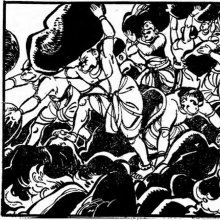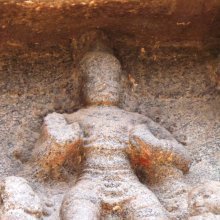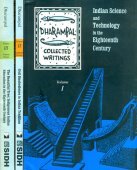Excitement: 1 definition
Introduction:
Excitement means something in Hinduism, Sanskrit. If you want to know the exact meaning, history, etymology or English translation of this term then check out the descriptions on this page. Add your comment or reference to a book if you want to contribute to this summary article.
Images (photo gallery)
In Hinduism
Natyashastra (theatrics and dramaturgy)
Source: Shodhganga: Elements of Art and Architecture in the Trtiyakhanda of the Visnudharmottarapurana (natya)1) Excitement (expression) is associated with Mandālasa: one of the nine kinds of śayyāsthāna or “lying down postures” (in Indian Dramas), as conveyed through Āṅgikābhinaya: one of the four divisions of Abhinaya or “ways to convey or represent one’s emotion to others”, according to the Nāṭyaśāstra and the Viṣṇudharmottarapurāṇa, an ancient Sanskrit text which (being encyclopedic in nature) deals with a variety of cultural topics such as arts, architecture, music, grammar and astronomy.— The word mandālasa is the amalgamation of two words viz., manda i.e., slow and ālasa i.e., lazyness. To show worry, sadness and separation as well as excitement, the actor should stretch one leg and sit on other and this position is called mandālasa posture.
2) Walking in Excitement is associated with Sthira-gati: one of the various Gatis (“way of walking”).—Sthira-gati denotes the steady movements. To show walking in fever, hunger, disease, tiredness due to penance, dissimulation, excitement, love and sorrow or ease, slow gait should be adopted by the artist. The lover who goes to meet his or her secret lover adopts the sthiragati. In darkness or if a deformed creature is visible or if a person walks a long way, the gait of a person becomes automatically slow down.

Natyashastra (नाट्यशास्त्र, nāṭyaśāstra) refers to both the ancient Indian tradition (shastra) of performing arts, (natya—theatrics, drama, dance, music), as well as the name of a Sanskrit work dealing with these subjects. It also teaches the rules for composing Dramatic plays (nataka), construction and performance of Theater, and Poetic works (kavya).
See also (Relevant definitions)
Full-text (+606): Avega, Sambhama, Ardana, Ghurami, Garamagarami, Protsaha, Ceva, Uttejana, Savegam, Kshobha, Adhairya, Ghumaranem, Uttapa, Indriyabodhana, Pravarta, Gurama, Apravritti, Auddhatya, Jitendriya, Ghayakuta.
Relevant text
Search found 137 books and stories containing Excitement; (plurals include: Excitements). You can also click to the full overview containing English textual excerpts. Below are direct links for the most relevant articles:
The Agni Purana (by N. Gangadharan)
Chapter 231 - The good and bad auguries known from the sounds of animals and birds
Chapter 339 - Description of the sentiments, emotions, hero etc. (rasa)
Human Life < [July – September, 2006]
Decolonizing the Mind: Dialectic of the Personal and the Continental in Ayi Kwei Armah’s “Why are we so best” < [Jan. – Mar. 1991 & Apr. – Jun. 1991]
The Road was Broad but Blind < [July – September, 1987]
Jainism and Patanjali Yoga (Comparative Study) (by Deepak bagadia)
Jain Philosophy and Practices < [Chapter 3 - Jain Philosophy and Practice]
Maha Prajnaparamita Sastra (by Gelongma Karma Migme Chödrön)
Section B.4 - Removing excitement (restlessness) and regret < [Part 2 - Means of acquiring meditation]
Section B - Second method: removing the obstacles < [Part 2 - Means of acquiring meditation]
VI. Where the destruction of the traces is located < [VIII. Destroying the traces of the conflicting emotions]
Mundaka Upanishad with Shankara’s Commentary (by S. Sitarama Sastri)
Puranic encyclopaedia (by Vettam Mani)
Related products



